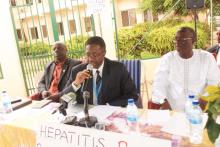Gambia commemorates World Hepatitis Day 2015
Banjul, The Gambia, 1st September 2015 - On 28 July 2015, the Ministry of Health and Social Welfare in collaboration with the World Health Organization (WHO), Medical Research Council (MRC) and other partners commemorated World Hepatitis Day under the theme: “Prevent Hepatitis – Act now”. The theme this year focuses on the prevention of hepatitis B and C that affects hundreds of millions of people worldwide, causing acute and chronic liver disease and killing close to 1.5 million people every year.
The Hon. Minister for Health and Social Welfare, Hon. Omar Sey, launched the event at Sere Kunda General Hospital. He described the maiden celebration of this important Day as a further demonstration of his Ministry’s commitment to controlling hepatitis B in the general population bearing in mind that the Gambia was the test ground for the introduction of hepatitis B vaccination in routine immunization services. He paid tribute to the contributions and support of the MRC, WHO, the Government of the Gambia and other partners in ensuring that this became a reality.
He also thanked the WHO, MRC, GHIS (Gambia Hepatitis Intervention Study) as well as staff of his Ministry for spearheading the maiden commemoration of World Hepatitis Day in the Gambia. He pledged his Ministry’s fullest support to the hepatitis campaign as well as its commitment to working with partners in addressing this public health problem. He urged the organizing team to work closely with the health promotion directorate in ensuring that the general public is aware of hepatitis and how to prevent it as a public health problem in the Gambia.
“We need to work hard to ensure that the general public is safe from this illness”, Hon Minister remarked.
For his part, the WHO Representative Dr. Sagoe-Moses used the occasion to highlight key messages in the Regional Director’s message on World Hepatitis Day 2015. He said that viral hepatitis is a serious but under-recognized global public health problem. In the African Region, hepatitis B affects an estimated 100 million people. He dilated on statistics of adults chronically infected with hepatitis C in the Region but noted that despite severe complications, most people with chronic viral hepatitis are not aware of their infection and do not receive appropriate treatment
Dr. Sagoe-Moses went further to say that viral hepatitis can be prevented through vaccinating, health workers and at risk populations, ensuring safe blood supplies and safe transfusions; safe injection practices; safe sex with condoms; and strengthening infection control practices in all health facilities.
“A safe and effective vaccine is widely available for the prevention of hepatitis B infection and has been introduced into routine childhood immunization schedules in all 47 Member States in the African Region and 75% of children have received the three doses”, he lamented.
While this is commendable, Dr. Sagoe-Moses stressed that much more needs to be done as most countries are yet to introduce the birth dose for new born children in order to prevent transmission of hepatitis B at birth.
He reported that as part of its support to countries, the World Health Organization (WHO) has developed the first normative guidelines for the prevention, care and treatment of hepatitis B and C to help programme managers to plan the scale up of hepatitis B and C prevention and treatment programmes as well as guide health care providers who care for persons with chronic hepatitis B and C.
In conclusion, Dr. Sagoe-Moses also commended the organizing team comprising the Ministry of Health and Social Welfare, GHIS, MRC and the WHO Country Office for this great effort in commemorating World Hepatitis Day for the first time in the Gambia. He assured the Honourable Minister of the WHO’s continued support to the hepatitis campaign.
Speaking earlier, Dr. Ramou Njie, a specialist in liver diseases and head of both the Gambia Hepatitis Intervention Study, GHIS and the Prevention of Liver Fibrosis and Cancer in Africa (PROLIFICA) project, based at the MRC, gave a brief history of the hepatitis programme in The Gambia highlighting the phased introduction of hepatitis B virus (HBV) vaccination of Gambian children between 1986 and 1990.She said that although HBV vaccination programmes have been established by many countries, as recommended by WHO, vaccination does not help those who are already infected with the virus. This, therefore, necessitated the design of another study aimed at preventing liver cirrhosis and cancer by treatment (as opposed to vaccination) of those who are already infected with HBV, called the Prevention of Liver Fibrosis and Cancer in Africa (PROLIFICA) project.
“PROLIFICA project involves The Gambia, Nigeria, and Senegal, with partners in Imperial College London and IARC/WHO. It is the first HBV treatment programme in Sub-Saharan Africa, and one of its main aims is to determine whether treatment of HBV with a drug called Tenofovir can prevent the development of liver cancer in those who are infected”, Dr. Njie remarked.
Professor Umbretto, Director of MRC-Gambia, also pledged his institution’s support to the hepatitis campaign and commended, in particular, the excellent collaboration between MRC and the Government in promoting health research in the Gambia.
The ceremony, which was preceded by a march past, ended in free testing of volunteers to know their hepatitis status.
_________________________________________________
For more information, please contact:
Mr. Momodou Gassama, Health Promotion Officer, gassamam [at] gm.afro.who.int (gassamam[at]gm[dot]afro[dot]who[dot]int), (+220) 4462286
Mr. George. Williams, Health Information Assistant, williamsg [at] gm.afro.who.int (williamsg[at]gm[dot]afro[dot]who[dot]int) (+220) 4462284










